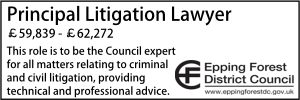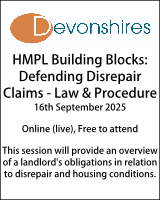Errors of law, materiality and remedies
A recent Court of Appeal case concerning “restocking notices” in forestry has wider lessons in relation to errors of law and remedies, write Heather Sargent and Charles Bishop.
- Details
The Court of Appeal has dismissed an appeal by the claimant in R (Wickford Development Company Ltd) v Secretary of State for Environment, Food and Rural Affairss [2025] EWCA Civ 882.
As well as being the first Court of Appeal judgment concerning the issuing of “restocking notices” under the Forestry Act 1967, for public lawyers more generally, the judgment is interesting for its assessment of the relevance of “materiality” to errors of law and how that interacts with remedies.
The regulation of felling trees
The felling of growing trees requires a felling licence issued under section 10 of the Forestry Act 1967 (the Act): section 9. This is unless an exception applies, perhaps the most important being that felling of trees on land comprised in a garden does not require a licence.
It is an offence under section 17 to fell a tree without a licence where one is required. This can be prosecuted up to six months after the commission of the offence.
The Act also provides that the Forestry Commission may serve a “restocking notice” on a person where it appears to the Forestry Commission that they have committed an offence and have the required estate or interest in land: section 17A(1). This requires them to restock or stock with trees the land or such other land as may be agreed by the individual and the Forestry Commission, and maintain those trees for up to ten years.
The person served with a restocking notice can object to the notice by appealing to the Secretary of State for Environment, Food and Rural Affairs (“the Minister”) who, unless she considers the grounds are frivolous, must refer the matter to a “reference committee”: section 17B. The reference committee must report on the matter to the Minister who, after considering the report, may direct the Forestry Commission to withdraw the restocking notice or notify the objector that it shall have effect subject to modification.
The appeal
This case concerned the felling of trees south of Newton Hall, Dunmow, Esssex in 2017. There was a dispute over the exact number, but it was likely either nine trees or five trees plus four groups of trees.
The CPS initially charged the claimant, Wickford Development Company, with an offence under s. 17, but then withdrew that in March 2020. In June 2020, the Forestry Commission issued a restocking notice requiring Wickford to restock what amounted to 242 trees and maintain them for ten years. The claimant appealed to the Minister, who dismissed the appeal and upheld the restocking notice. Some of the arguments before the Minister included:
- that it was an abuse of power to issue the restocking notice in circumstances where the CPS had withdrawn prosecution and it was after the time limit for issuing a new prosecution;
- that the land was comprised in a garden and so no felling licence was required; and
- that the number of trees required to be restocked was disproportionate to the number felled.
The claimant brought a claim for judicial review of the Minister’s decision, which was dismissed by Lieven J in the High Court. She held that:
- the Minister either did not consider the abuse of power argument or did not give reasons as to it. However, the argument was wrong and so, relying on section 31(2A) of the Senior Courts Act 1981, she refused to grant relief as the outcome would have been the same;
- the land was not a garden; and
- the Minister’s decision as to the number of trees required to be restocked was rational.
The claimant appealed to the Court of Appeal on issues (i) and (iii). The Court dismissed the appeal.
As to issue (i), the Court held that the Minister had not dealt with the abuse of power argument. Lewis LJ, giving the judgment of the Court, explained the statutory framework as follows:
“43. … A person served with a restocking notice has a right to make an objection to the notice or its conditions. The objection has to be referred to a reference committee (unless it is frivolous). That committee must make a report to the Minister. It is implicit that that report will deal with the objection made. Similarly, the Minister, having considered the report, must decide whether to direct that the notice be withdrawn or tell the objector that it shall have effect (with or without modification). It is implicit that the Minister will consider and deal with the objection…”
However, Lewis LJ went on to find that the error was not “material” because it could not affect the outcome of the appeal to the Minister, as the abuse of power argument was wrong as a matter of law. Explaining the relevance of materiality to errors of law and its interaction with discretionary remedies and section 31(2A), he held as follows:
“47. … Not all errors have to be analysed by reference to the terms of section 31(2A). The first question is whether the error led to the decision being unlawful. Some errors are not material and do not, therefore, render a decision unlawful. That is, on analysis, the situation here. Secondly, the question may be whether a remedy should be refused as a matter of discretion in the light of recognised principles or whether the court must refuse a remedy because of section 31(2A). In the present case, it was not necessary to consider the effect of section 31(2A) of the 1981 Act. I would, however, make the following observations. First, the judge relied upon the approach set out in R (Cava Bien Ltd) v Milton Keynes Council [2022] RVR 37. Second, she understood that case as requiring the court to conduct its own assessment. That approach is wrong, as this Court ruled in R (Bradbury) v Awdurdod Cenedlaethol Bannau Brycheiniog (Brecon Beacons National Park Authority) [2025] EWCA Civ 489 at paragraphs 71 and 74. As the Court indicated, reliance on the approach set out in Cava Bien would be likely to lead a court into error, as happened here (although, in fairness to the judge in the present case, she gave her decision before the Court of Appeal decision in Bradbury and at a time when it was common for courts to follow the decision in Cava Bien). For the future, the approach in Cava Bien should not be followed.”
As for the issue of the proportionality of the number of trees felled, the Court agreed with the assessment of Lieven J that the Minister’s decision was rational.
Heather Sargent and Charles Bishop are barristers at Landmark Chambers. They acted for the successful Secretary of State for Environment, Food and Rural Affairs, instructed by the Government Legal Department.
Trust Solicitor (Public & Healthcare Law)
Trust Solicitor (Employment & Contract Law)
Locums
Poll


























